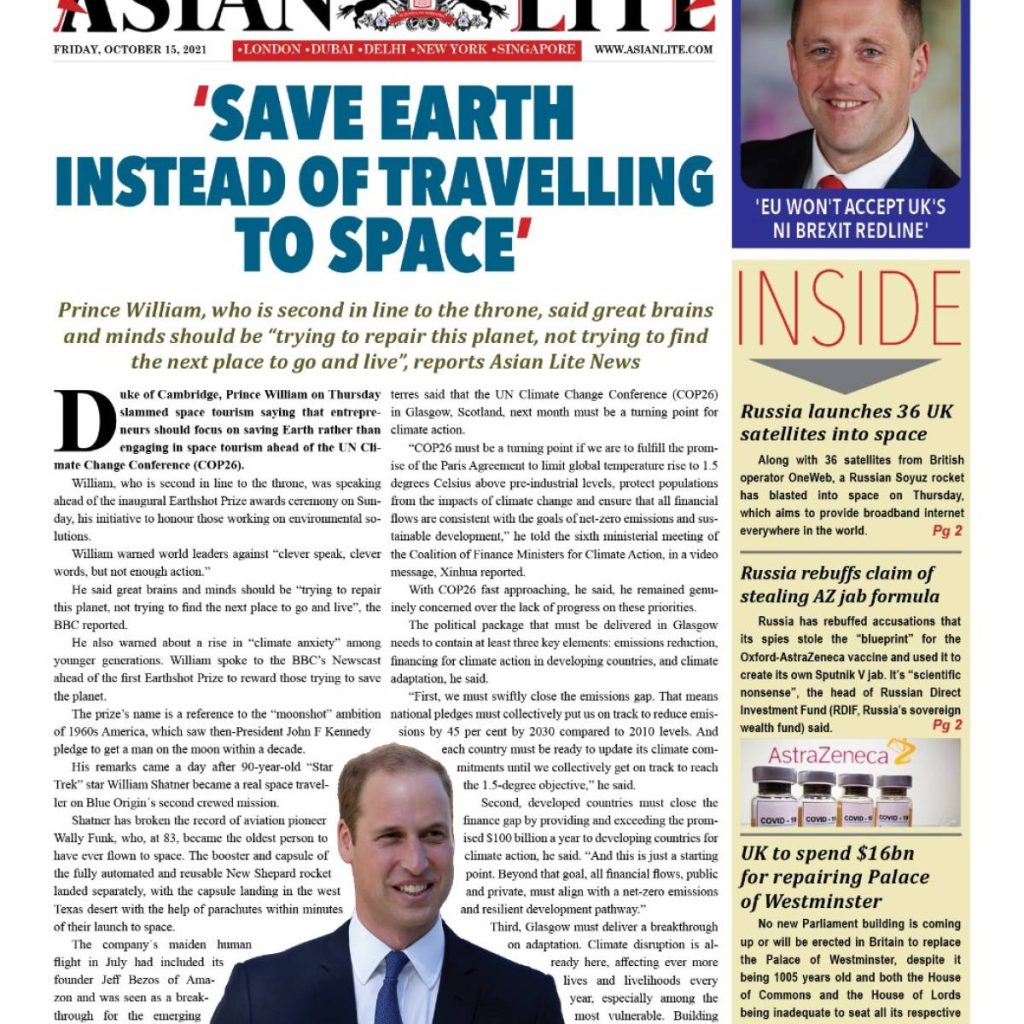Prince William, who is second in line to the throne, said great brains and minds should be “trying to repair this planet, not trying to find the next place to go and live”, reports Asian Lite News
Duke of Cambridge, Prince William on Thursday slammed space tourism saying that entrepreneurs should focus on saving Earth rather than engaging in space tourism ahead of the UN Climate Change Conference (COP26).
William, who is second in line to the throne, was speaking ahead of the inaugural Earthshot Prize awards ceremony on Sunday, his initiative to honour those working on environmental solutions.
William warned world leaders against “clever speak, clever words, but not enough action.”
He said great brains and minds should be “trying to repair this planet, not trying to find the next place to go and live”, the BBC reported.
He also warned about a rise in “climate anxiety” among younger generations. William spoke to the BBC’s Newscast ahead of the first Earthshot Prize to reward those trying to save the planet.
The prize’s name is a reference to the “moonshot” ambition of 1960s America, which saw then-President John F Kennedy pledge to get a man on the moon within a decade.
His remarks came a day after 90-year-old “Star Trek” star William Shatner became a real space traveller on Blue Origin´s second crewed mission.
Shatner has broken the record of aviation pioneer Wally Funk, who, at 83, became the oldest person to have ever flown to space. The booster and capsule of the fully automated and reusable New Shepard rocket landed separately, with the capsule landing in the west Texas desert with the help of parachutes within minutes of their launch to space.
The company´s maiden human flight in July had included its founder Jeff Bezos of Amazon and was seen as a breakthrough for the emerging space tourism sector.
Earlier, UN Secretary-General Antonio Guterres said that the UN Climate Change Conference (COP26) in Glasgow, Scotland, next month must be a turning point for climate action.
“COP26 must be a turning point if we are to fulfill the promise of the Paris Agreement to limit global temperature rise to 1.5 degrees Celsius above pre-industrial levels, protect populations from the impacts of climate change and ensure that all financial flows are consistent with the goals of net-zero emissions and sustainable development,” he told the sixth ministerial meeting of the Coalition of Finance Ministers for Climate Action, in a video message, Xinhua reported.
With COP26 fast approaching, he said, he remained genuinely concerned over the lack of progress on these priorities.
The political package that must be delivered in Glasgow needs to contain at least three key elements: emissions reduction, financing for climate action in developing countries, and climate adaptation, he said.
“First, we must swiftly close the emissions gap. That means national pledges must collectively put us on track to reduce emissions by 45 per cent by 2030 compared to 2010 levels. And each country must be ready to update its climate commitments until we collectively get on track to reach the 1.5-degree objective,” he said.
Second, developed countries must close the finance gap by providing and exceeding the promised $100 billion a year to developing countries for climate action, he said. “And this is just a starting point. Beyond that goal, all financial flows, public and private, must align with a net-zero emissions and resilient development pathway.”
Third, Glasgow must deliver a breakthrough on adaptation. Climate disruption is already here, affecting ever more lives and livelihoods every year, especially among the most vulnerable. Building resilience and adapting must be a priority for all, said Guterres.

“I ask each of you in your national capacity and as shareholders of national and multilateral development banks to consider allocating half of all public climate finance in support of developing countries for adaptation. And I ask that you reconsider how you calculate gross domestic product. Nature’s resources still do not figure in countries’ calculations of wealth. We need nature-based solutions for adaptation and mitigation. The current system is weighted toward destruction, not preservation. Governments must reflect nature’s true value in all policies, plans and economic systems,” he said.
As COVID-19 and climate change pose new and unique challenges to low- and middle-income countries, he asked the finance ministers to revise eligibility thresholds for official development assistance to improve access to finance for those countries.
ALSO READ-Sharma to don dual role as Business Secretary and President – COP 26
READ MORE-India, UK set to announce ‘green grid’ at COP26 summit

Leave a Reply